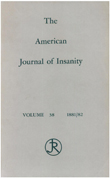Psychotherapy in community methadone programs: a validation study
Abstract
OBJECTIVE: The authors tested the efficacy of individual psychotherapy in the rehabilitation counseling of psychiatrically symptomatic opiate- dependent patients during methadone maintenance treatment in community programs. METHOD: Volunteers in three community programs were randomly assigned to 24 weeks of counseling plus supplemental drug counseling or to counseling plus supportive-expressive psychotherapy. Follow-ups were done 1 and 6 months after treatment ended. A total of 84 subjects were evaluated at both follow-up points. RESULTS: During the study the patients receiving supportive-expressive psychotherapy and those receiving drug counseling had similar proportions of opiate-positive urine samples, but the patients receiving supportive-expressive psychotherapy had fewer cocaine-positive urine samples and required lower doses of methadone. One month after the extra therapy ended both groups had made significant gains, but there were no significant differences between groups. By 6-month follow-up many of the gains made by the drug counseling patients had diminished, whereas most of the gains made by the patients who received supportive-expressive psychotherapy remained or were still evident; many significant differences emerged, all favoring supportive-expressive psychotherapy. CONCLUSIONS: Psychotherapy can be delivered to psychiatrically impaired patients in community methadone programs. Additional counseling is associated with early benefits comparable to those from psychotherapy, but these gains are not sustained. The gains associated with psychotherapy persist and in some cases strengthen for at least 6 months after the end of therapy.
Access content
To read the fulltext, please use one of the options below to sign in or purchase access.- Personal login
- Institutional Login
- Sign in via OpenAthens
- Register for access
-
Please login/register if you wish to pair your device and check access availability.
Not a subscriber?
PsychiatryOnline subscription options offer access to the DSM-5 library, books, journals, CME, and patient resources. This all-in-one virtual library provides psychiatrists and mental health professionals with key resources for diagnosis, treatment, research, and professional development.
Need more help? PsychiatryOnline Customer Service may be reached by emailing [email protected] or by calling 800-368-5777 (in the U.S.) or 703-907-7322 (outside the U.S.).



